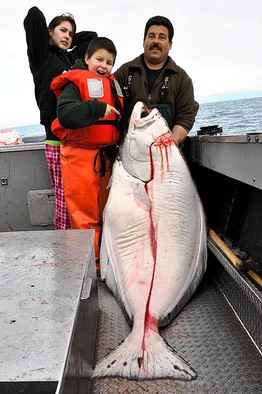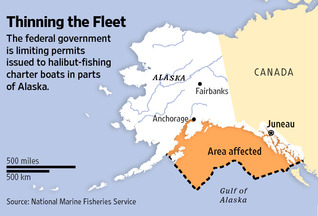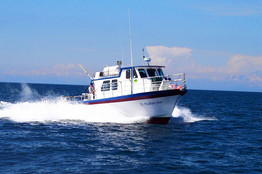Sushihunter
Active Member
http://online.wsj.com/article/SB10001424052748704307404576079940703104156.html?mod=googlenews_wsj
Skippers at Sea Over a License to Fish
Federal Officials Curb Permits to Alaska's Chartered Halibut Fleet to Stop Overfishing, but Some Boat Operators Fear Ruin
By JIM CARLTON
A federal move to ground at least a third of Alaska's chartered halibut-fishing fleet is under fire from officials in the rapidly growing industry, who say the plan will deal a blow to the state's already struggling tourism sector.
Jack Roskind is feeling the cutback at first hand. The 42-year-old skipper of a 28-foot charter boat, The Patriot Express, was recently denied a halibut charter permit under new federal rules going into effect in Alaska next month that fisheries officials say are needed to ease pressure on commercial fisherman and protect the dwindling supply of halibut in the region.
Associated Press

Boat operator Steve Smith, above, show off a halibut in Ninilchik, Alaska last June.
With $100,000 invested in his boat, Mr. Roskind said he couldn't afford to sit out the halibut season, which runs from May through September. He is among 121 businesses appealing permit denials to the National Marine Fisheries Service, which is implementing the rules. Some 270 of Alaska's 800 charter businesses are being denied permits.
"If I don't fish, it will bankrupt me," said Mr. Roskind, who has run his boat out of the Prince William Sound village of Whittier since 2006.
Chartered halibut-fishing—until now an unregulated industry—is one of the most popular tourist experiences in Alaska, and the biggest saltwater type of sport-fishing in the state. At a cost of between $200 and $300 a day, a customer can fish amid spectacular scenery, surrounded by wildlife including whales and bears.
Unlike many commercial fisheries, sport-fishing charter boats don't make a lot of money. In a good season a captain can make about $20,000 running tours, said Greg Sutter, president of the Alaska Charter Association, a trade group in Homer, Alaska.
The permit program is taking place under the National Marine Fisheries Service's Limited Access Program, which starting Feb. 1 reduces the number of permits for halibut charter-fishing by a third. Under the rules, applicants who didn't operate a halibut charter in either 2004 or 2005 in addition to 2008 don't qualify. A similar program was implemented for sport-fishing boats in the Gulf of Mexico a few years ago, officials say.
The National Marine Fisheries Service said the rules originated from the North Pacific Fishery Management Council, one of eight regional councils established by Congress to oversee federal fisheries. The Council devised the cutbacks to curb what Alaskan officials call the runaway growth of halibut charter boats in recent years, even as wildlife managers have put limits on the fish's catch for conservation purposes.

Between 1998 and 2008, the number of active charter boats in the biggest sport-fishing areas off Alaska jumped 23% to 1,327 vessels from 1,072, according to National Marine Fisheries Service estimates.
The halibut stock meanwhile has declined over the past decade, and is projected to drop to 134 million pounds this year from 156 million in 2010, said Gregg Williams, a biologist with the International Pacific Halibut Commission in Seattle.
Industry officials, however, said the permit denials were likely to cast a chill over Alaska's tourism sector, one of the state's prime economic drivers. Sport-fishing, including halibut, is itself a $1.3 billion industry, according to state estimates. Tourism has been struggling to recover after a 7.3% drop in visitors during the busy summer season in 2009 from the previous year. The number fell another 6.3% in 2010, according to preliminary state estimates.
"If someone's main objective is to fish in Alaska, they will seek alternatives if they can't find a boat available and that's going to hurt our tourism," said Mr. Sutter.
Fisheries officials said they expected a reduced halibut charter fleet to be able to meet public demand. The permit curtailment was needed because Alaska's charter industry has been inundated with boats from outside the state, said Jane DiCosimo, senior plan coordinator for the North Pacific Fishery Management Council. That has hurt commercial fishermen, whose numbers for halibut were already restricted, in 1995, to prevent overfishing, she said.
"From a national perspective, this program is viewed as bringing stability in the charter sector," she said.
K-Bay Charters

A halibut-fishing boat off Homer, Alaska.
Indeed, many boat captains have expressed their support for the program. Tom O'Haus, a charter captain in Sitka who got a permit, said something needed to be done as there were too many boats after too few fish. There was also adequate notice by federal officials, he said. "I don't mean to be hard-hearted, but this was well publicized for many years," Mr. O'Haus said.
And some fishermen have seen the value of their permits rise sharply. Mr. Sutter said some permits that can be transferred to other boats were now fetching as much as $70,000.
In the town of Soldotna, the permit program has had other consequences. One regular customer has notified the 16-room Soldotna B&B Lodge that he is looking elsewhere to fish after he lost a permit to run a halibut boat for the lodge's guests, said Steve Anderson, chief executive officer of the lodge. "His exact words: 'I am frustrated and tired of worrying'," Mr. Anderson said.
Rachel Baker, a management specialist at the marine fisheries service, said her staff would decide permit appeals based on the rules of the program.
If they lose their appeals, some captains said they'd sue the National Marine Fisheries Service. "Without a permit, the value of my business is, 'I don't know'," said Kent Haina in Homer, who owns a charter boat called the "Last Laugh."
Write to Jim Carlton at jim.carlton@wsj.com
Copyright 2011 Dow Jones & Company, Inc. All Rights Reserved
Skippers at Sea Over a License to Fish
Federal Officials Curb Permits to Alaska's Chartered Halibut Fleet to Stop Overfishing, but Some Boat Operators Fear Ruin
By JIM CARLTON
A federal move to ground at least a third of Alaska's chartered halibut-fishing fleet is under fire from officials in the rapidly growing industry, who say the plan will deal a blow to the state's already struggling tourism sector.
Jack Roskind is feeling the cutback at first hand. The 42-year-old skipper of a 28-foot charter boat, The Patriot Express, was recently denied a halibut charter permit under new federal rules going into effect in Alaska next month that fisheries officials say are needed to ease pressure on commercial fisherman and protect the dwindling supply of halibut in the region.
Associated Press

Boat operator Steve Smith, above, show off a halibut in Ninilchik, Alaska last June.
With $100,000 invested in his boat, Mr. Roskind said he couldn't afford to sit out the halibut season, which runs from May through September. He is among 121 businesses appealing permit denials to the National Marine Fisheries Service, which is implementing the rules. Some 270 of Alaska's 800 charter businesses are being denied permits.
"If I don't fish, it will bankrupt me," said Mr. Roskind, who has run his boat out of the Prince William Sound village of Whittier since 2006.
Chartered halibut-fishing—until now an unregulated industry—is one of the most popular tourist experiences in Alaska, and the biggest saltwater type of sport-fishing in the state. At a cost of between $200 and $300 a day, a customer can fish amid spectacular scenery, surrounded by wildlife including whales and bears.
Unlike many commercial fisheries, sport-fishing charter boats don't make a lot of money. In a good season a captain can make about $20,000 running tours, said Greg Sutter, president of the Alaska Charter Association, a trade group in Homer, Alaska.
The permit program is taking place under the National Marine Fisheries Service's Limited Access Program, which starting Feb. 1 reduces the number of permits for halibut charter-fishing by a third. Under the rules, applicants who didn't operate a halibut charter in either 2004 or 2005 in addition to 2008 don't qualify. A similar program was implemented for sport-fishing boats in the Gulf of Mexico a few years ago, officials say.
The National Marine Fisheries Service said the rules originated from the North Pacific Fishery Management Council, one of eight regional councils established by Congress to oversee federal fisheries. The Council devised the cutbacks to curb what Alaskan officials call the runaway growth of halibut charter boats in recent years, even as wildlife managers have put limits on the fish's catch for conservation purposes.

Between 1998 and 2008, the number of active charter boats in the biggest sport-fishing areas off Alaska jumped 23% to 1,327 vessels from 1,072, according to National Marine Fisheries Service estimates.
The halibut stock meanwhile has declined over the past decade, and is projected to drop to 134 million pounds this year from 156 million in 2010, said Gregg Williams, a biologist with the International Pacific Halibut Commission in Seattle.
Industry officials, however, said the permit denials were likely to cast a chill over Alaska's tourism sector, one of the state's prime economic drivers. Sport-fishing, including halibut, is itself a $1.3 billion industry, according to state estimates. Tourism has been struggling to recover after a 7.3% drop in visitors during the busy summer season in 2009 from the previous year. The number fell another 6.3% in 2010, according to preliminary state estimates.
"If someone's main objective is to fish in Alaska, they will seek alternatives if they can't find a boat available and that's going to hurt our tourism," said Mr. Sutter.
Fisheries officials said they expected a reduced halibut charter fleet to be able to meet public demand. The permit curtailment was needed because Alaska's charter industry has been inundated with boats from outside the state, said Jane DiCosimo, senior plan coordinator for the North Pacific Fishery Management Council. That has hurt commercial fishermen, whose numbers for halibut were already restricted, in 1995, to prevent overfishing, she said.
"From a national perspective, this program is viewed as bringing stability in the charter sector," she said.
K-Bay Charters

A halibut-fishing boat off Homer, Alaska.
Indeed, many boat captains have expressed their support for the program. Tom O'Haus, a charter captain in Sitka who got a permit, said something needed to be done as there were too many boats after too few fish. There was also adequate notice by federal officials, he said. "I don't mean to be hard-hearted, but this was well publicized for many years," Mr. O'Haus said.
And some fishermen have seen the value of their permits rise sharply. Mr. Sutter said some permits that can be transferred to other boats were now fetching as much as $70,000.
In the town of Soldotna, the permit program has had other consequences. One regular customer has notified the 16-room Soldotna B&B Lodge that he is looking elsewhere to fish after he lost a permit to run a halibut boat for the lodge's guests, said Steve Anderson, chief executive officer of the lodge. "His exact words: 'I am frustrated and tired of worrying'," Mr. Anderson said.
Rachel Baker, a management specialist at the marine fisheries service, said her staff would decide permit appeals based on the rules of the program.
If they lose their appeals, some captains said they'd sue the National Marine Fisheries Service. "Without a permit, the value of my business is, 'I don't know'," said Kent Haina in Homer, who owns a charter boat called the "Last Laugh."
Write to Jim Carlton at jim.carlton@wsj.com
Copyright 2011 Dow Jones & Company, Inc. All Rights Reserved
